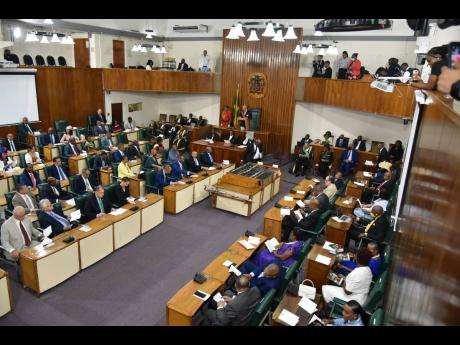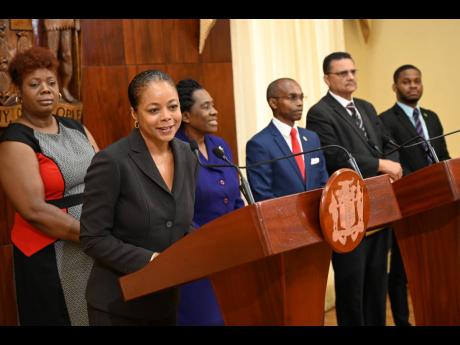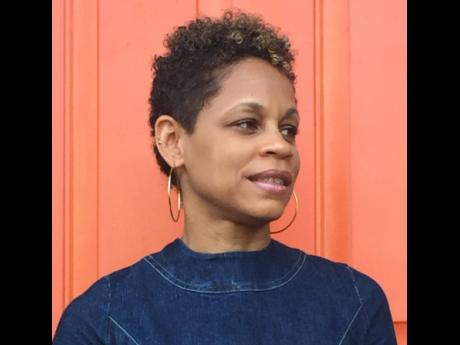Maziki Thame | Race and legitimacy in Jamaican politics
Rastafari has told us “down with white and black oppressors”. It is hoped that we can assess our political leaders by that measure – the extent to which their works indicate their position in relation to the well-being of the broad base of the Jamaican people. That is not to say that race does not matter.
Notions of citizenship have been used to exclude as well as include, to say who belongs and who does not. In recent “debates” about the status of Mark Golding’s citizenship, the undercurrent of legitimacy to rule, highlighted in The Gleaner editorial of May 22, is race as the route to belonging. The JLP has tried to put a wedge in Golding’s claim to legitimacy as a potential Prime Minister of Jamaica based on race and citizenship.
Nigel Clarke’s use of the moniker Massa Mark to delegitimise Golding seems to have had resonance with The Gleaner cartoonist Las May, who consistently portrays Golding with chain and shackle. Juliet Cuthbert-Flynn, recently took to social media arguing that “Massa Mark’s” British citizenship is the reason he supports dual citizenship for parliamentarians. She argued that he is less Jamaican than blacks whose ancestors cut cane [as enslaved people] and were fighting for land ownership. And the prime minister has called on Golding to renounce his British citizenship on moral grounds, since he argues, it questions Golding’s commitment to the nation.
The fight for land rights is a useful point upon which to judge legitimacy in the Rastafari frame – “down with white and black oppressors”. Jamaica’s tourism minister Edmund Bartlett has been lauded and is lauding Jamaica’s tourism performance in recent times. Tourism dependence is not, however, questioned. In the past, Jamaican economists advocated for diversification of the economy given the vulnerability created by said dependence. We saw, for instance, how workers were displaced and made vulnerable due to the cessation of travel during the COVID-19 pandemic and the lack of protections in their employment in the sector.
In his 2024 sectoral debate, Bartlett claimed the sector could “take you from nothing” to something. He said he wanted to “totally erase” the image of tourism as being for the big man, because “it is not true”. How does this figure in terms of the fact that several matters are in the courts where the “small man” is battling the state and essentially, the tourism sector for beach access to make their bread? How does this figure in relation to the low wages in the sector? How does this figure in terms of the lack of affordable housing for tourism workers? In fact, for all workers?
The nation might begin to consider whether the structure of the economy championed by the JLP based on the expansion of tourism, historically seen as a remodelling of plantation economics, honours those ancestors Cuthbert-Flynn calls on who were fighting to own the land.
Bartlett recently unveiled the bust of Jamaica’s first “wet t-shirt girl” which celebrates the Jamaica Tourist Board’s use of the image in marketing the island. This best epitomises the fact that we are not just selling sand, sun and sea but also sex. The tourism sector is plagued by a racial dynamic that exploits black bodies in the marketing of sex and in giving low wage service to, especially whites. Is this what we as a nation aspire to?
Jamaica’s discourse of nationhood has long exploited racial understandings that do not serve black people. Jamaica’s national motto chosen at independence, “Out of Many, One People” suggested there was racial harmony in the nation, in spite of discontent which resulted in the rise of Black Power in the first decade of independence. The motto also negated the fact that Jamaica is a black majority nation. It was most legitimising to browns in Jamaica – the ‘real’ out of many, who are privileged by their colour and who dominated political leadership until P.J. Patterson. Of course, black people generally preferred to think of themselves as mixed. They wished to separate themselves from the historically denigrated status of blackness and proximity to Africa and our leadership would have understood that desire in their symbolic deployment of Out of Many.
The political parties’ race-class association loosely characterised the JLP as the party of whites, “red people”, the wealthy and the stone-breaking poor, up against the PNP’s brown, intellectual, socialist-minded middle class and the poor. In the 1970s when blackness was celebrated, Jamaica’s brown prime minister’s marriage to Beverly Anderson improved his legitimacy as a man of the people. Michael Manley’s left-leaning was also critical to his legitimacy as being for the people.
When the first elected “black” prime minister campaigned for the position in 1992, he did so on the basis that it was “Black Man Time” against Edward Seaga’s whiteness. Patterson also deployed a form of black bourgeois nationalism in his role as prime minister. By the time Portia Simpson Miller came to power, the nation had grappled with and seemed to have rejected the understandings of the independence generation about who we are and who should represent us. They were no longer taking their cues from browns and the “respectable” middle class. Her status as a black woman from the bottom endeared them to her but also caused her to be attacked as illegitimate.
Andrew Holness, himself a “light”-eyed brown, but from the bottom, claims legitimacy on the basis that he is from the people, having emerged from Spanish Town, with little or nothing, who came to something. He does not explicitly claim a racial vision but his colour gives him legitimacy in his party and the nation. He, and his party under him, tap into an idea of Jamaican striving, a “step up inna life or forever hol yu peace” individualism. The spectre of race is evoked in the utterances of the black bourgeois, Nigel Clarke and the former sports star, Juliet Cuthbert-Flynn. (High performance in sport has become a measure of Jamaicanness). Those utterances tell us Golding is from the oppressor (white massa) group and we are expected to conclude that he should not lead us.
Race should matter to Jamaicans’ understanding of politics. Jamaicans should ask, why do the social and economic structures reproduce black sufferation? They should ask why the black majority does not own the land or have access to its resources. They should ask whether black poverty is the fault of the black poor or if it is the social and economic structures that determine their life chances.
Jamaicans should ask what values are needed in their politics and economics to produce a society that values black people. They should take responsibility for educating themselves in a way that prevents them from becoming prey to the kind of manipulation that turns their attention to the surface of things, as against the works and aspirations of those interested in leading us.
Dr Maziki Thame is a political scientist at the University of the West Indies, Mona. Send feedback to columns@gleanerjm.com



